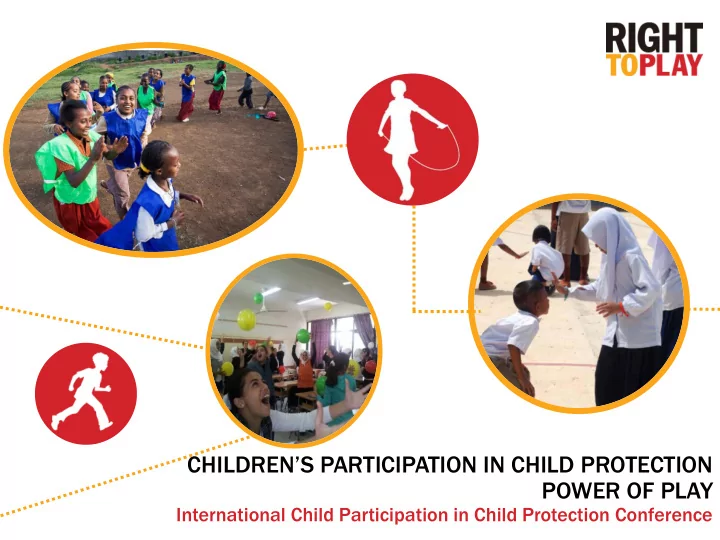

CHILDREN’S PARTICIPATION IN CHILD PROTECTION POWER OF PLAY International Child Participation in Child Protection Conference
| OVERVIE VIEW W Right To Play Child Participation Definition Organizational Community 2
RIGHT TO PLAY’S PROGRAM THEOR ORY OF CHANGE GE | THE BASIC MODEL Creating a healthy and safe world through the power of sport and play. Creating Sustainable Change Enhancing Transforming Building Education Health Peaceful Quality Practices Communities Posit itive e Child ld and Youth uth Developme elopment nt Child ld Prot otecti tion on Community nity Engagem agemen ent t Inclus lusion ion Gender nder Equalit ality We use sport t and play to educa cate e and empo mpower er childr dren en and youth h to overcome come the effec ects ts of pover erty ty, confl flict ict, and disea ease se in disadv dvan anta tage ged d commun muniti ties. es. 3
|CHILD ILD PART RTICIP ICIPATION TION Child participation is defined as “ongoing processes, which include information -sharing and dialogue between children and adults based on mutual respect, and in which children can learn how their views and those of adults are taken into account and shape the outcome of such processes” (UN Committee on the Rights of the Child, 2009, p. 5). Consultation Collaboration Child Led SPACE VOICE CE Children en must st be able to express ess a Children en must st be enabl abled ed to view expres ress s a view Meaningful ningful Pa Participa cipati tion on AUDIENC DIENCE INFL FLUEN UENCE CE Children must be listened to Views must be acted on as appropriate
| WHAT DOES THIS ACTUALLY MEAN FOR CHILDREN IN RIGHT TO PLAY PROGRAMS ?
| CHILDREN’S PARTICIPATION: PLAY-BASE BASED LEARNING RNING AND LIFE FE SKI KILL LL DEVEL ELOPM PMENT ENT EXPERIE ERIENCE E Shared experie ienc nce through physical activity, sport and play REFLEC ECT APPLY Reflect ect Explain how back on the one can use activity and or apply the what one experiences in experience other d situations in life CONNEC ECT Compare and connect nect what one experienced through the activity with previous experiences in life
| CHILDREN’S PARTICIPATION: ORG ORGAN ANIZ IZATIONA IONAL L RESOUR SOURCES CES AND PROCE ROCESS SSES ES 7
| CHILDREN’S PARTICIPATION: JU JUNIOR IOR LEA EADE DERS
Positive Child Youth Development: Leadership These programs are developing children's’ leadership skills and helping them become agents of change in their own communities. Children participating in Right To Play programs in Benin and Rwanda were found to be more involv olved ed in leader dership hip roles in their ir commun unit ities ies, , have e stronger ger levels vels of self-es esteem eem and Progr gram m well-bein eing, g, and be more respect ectful, ful, organ anize ized d and focus used ed. children: ildren: 79% 79% (DFATD AHEAD Final Evaluation Report, 2015) Non- progr gram In Benin, youn ung g leader ders are involv volved ed in influ luen encing ing and children: ildren: advoc vocat ating ing for youth th polic icies ies, , and in organiz anizing ing and [VALUE] LUE] partic icip ipating ating in community ity interven entio tions such as sensitization events, cleaning of public spaces, the creation of public infrastructures, and an area watch to prevent theft. In Rwanda, the percentage of program children with stron ong (DFATD AHEAD Final Evaluation Report, 2015) lead ader ersh ship ip skill ills was 11 “ Thanks to the techniques of advocacy and social mobilization percentage points higher than for [learned from RTP] I conducted a negotiation with the leaders non-program children, at 79% 79% vs of my community, which resulted in them granting us some 68% respectively. land for the construction of playing fields.” (DFATD AHEAD Final Evaluation Report, 2015) (Youth, rural Benin; DFATD AHEAD Final Evaluation Report, 2015)
QUES ESTIONS? TIONS? For any questions please contact Right To Play Child Protection Specialist Laura Wright at lwright@rightt right@righttopla oplay.com .com 10
Recommend
More recommend